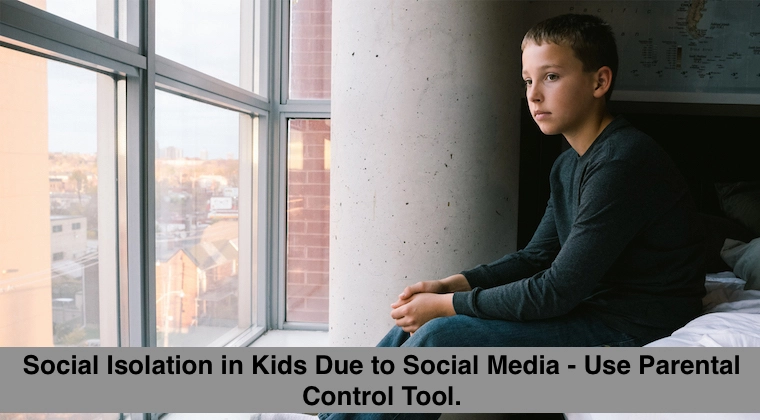Social Isolation in Kids Due to Social Media - Use Parental Control Tool

In today's digital age, social media has embedded itself deeply into the lives of children, proving to be a significant influence. From early exposure to smartphones and tablets, kids are living a life where social media and the things happening there have a strong influence of what they think. This growing influence is undeniable, with platforms like Facebook, Instagram, TikTok, and Snapchat becoming integral parts of their daily routines.
However, this use of social media among children has raised intense concerns, especially regarding social isolation. As children immerse themselves in a digital world, they may distance themselves from real-world connections, potentially resulting in feelings of loneliness and isolation.
In such cases, parents are sick-worried about their kids as they want them to interact socially and move forward in life. This is where a lot of communication is required and where parents need to guide their kids best. Along with that, the use of a good parental control tool has also proven to be very beneficial for the sake of protecting the kids from this isolation.
What is Social Isolation for Kids?
Social Isolation for kids means feeling lonely and cut off from others. It's when they don't have many friends to talk to or play with. Parents should worry about it because it can harm their child's mental and emotional well-being.
Kids need social interactions to learn and grow. When they are socially isolated, they miss out on essential life experiences. They might struggle with communication, empathy, and making friends. Loneliness can lead to sadness and even mental health issues.
In today's digital age, excessive screen time and cyberbullying can contribute to social isolation. Parents should be concerned because they can help prevent it. Encouraging real-life friendships, setting screen time limits, and monitoring online activities are ways parents can protect their kids from social isolation. It's vital to create a balance that allows children to enjoy technology while also fostering meaningful social connections.
Social Isolation: How Does It Happen?
Excessive screen time is a big factor. When kids spend too much time on screens, they might miss out on hanging out with their friends. Playing video games or scrolling through social media can be fun, but if it becomes the main thing, it can lead to feeling alone.
Cyberbullying is another concern. This happens when mean or hurtful things are said to kids online. It can be hurtful and make them want to avoid people. Feeling bullied online can lead to social isolation.
The decline in face-to-face interactions is a result of too much screen time. When kids are glued to their screens, they don't have as much time to talk and play with friends in person. Real-life connections are essential for kids to learn social skills and build friendships.
The Role of Parental control tool
A Parental control tool is digital tools designed to help parents safeguard their children's online experiences. These tools provide parents with the ability to manage and monitor their child's internet and device usage.
Effectiveness of Parental control tool
These apps can be highly effective in promoting safe and responsible online behavior among children. They allow parents to:
- Limit Screen Time: Parents can set daily or weekly screen time limits, ensuring that children do not spend excessive hours online.
- Block Inappropriate Content: These controls can block access to websites and content that may not be suitable for children, such as explicit material or violence.
- Monitor Online Activity: Parents can track their child's online activities, including the websites they visit and the apps they use.
- Manage App Downloads: Some parental control tools enable parents to approve or block app downloads, ensuring that children only access age-appropriate apps.
Establish Safe Search Settings: They can enforce safe search settings on search engines, preventing children from stumbling upon inappropriate content.
Parental controls are valuable tools for parents to maintain a safe online environment for their children by setting boundaries, monitoring usage, and protecting them from potentially harmful content.
Tips for Parents
Setting limits on screen time is essential. Consider these strategies:
- Define Clear Rules: Establish clear guidelines for when and how long your child can use screens each day. Consistency is key.
- Lead by Example: Be a role model by demonstrating healthy screen time habits yourself.
- Use Screen-Free Zones: Designate certain areas in your home, like the dining room, as screen-free zones to encourage face-to-face interactions.
Emphasize open communication with your child:
- Encourage Dialogue: Create an environment where your child feels comfortable discussing their online experiences, concerns, or questions.
- Teach Online Safety: Educate your child about online risks, including cyberbullying and privacy, so they know how to protect themselves.
Suggest activities to balance screen time:
- Promote Outdoor Play: Encourage physical activities like playing sports or going for hikes to balance screen time with fresh air and exercise.
- Explore Hobbies: Help your child discover hobbies or interests beyond screens, such as reading, painting, or playing a musical instrument.
- Family Time: Plan regular family activities like board games or movie nights to strengthen bonds offline.
By setting limits, fostering open communication, and using the best parental control tool, parents can strike a balance between technology and real-life experiences, ensuring their child's healthy development.








